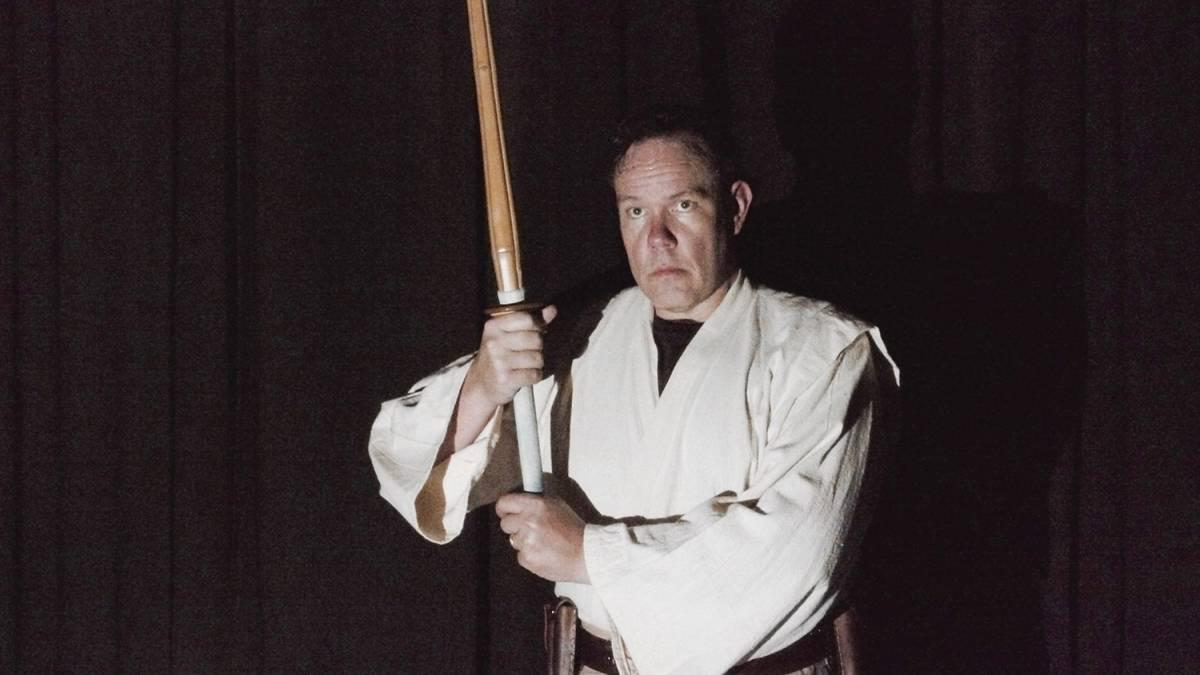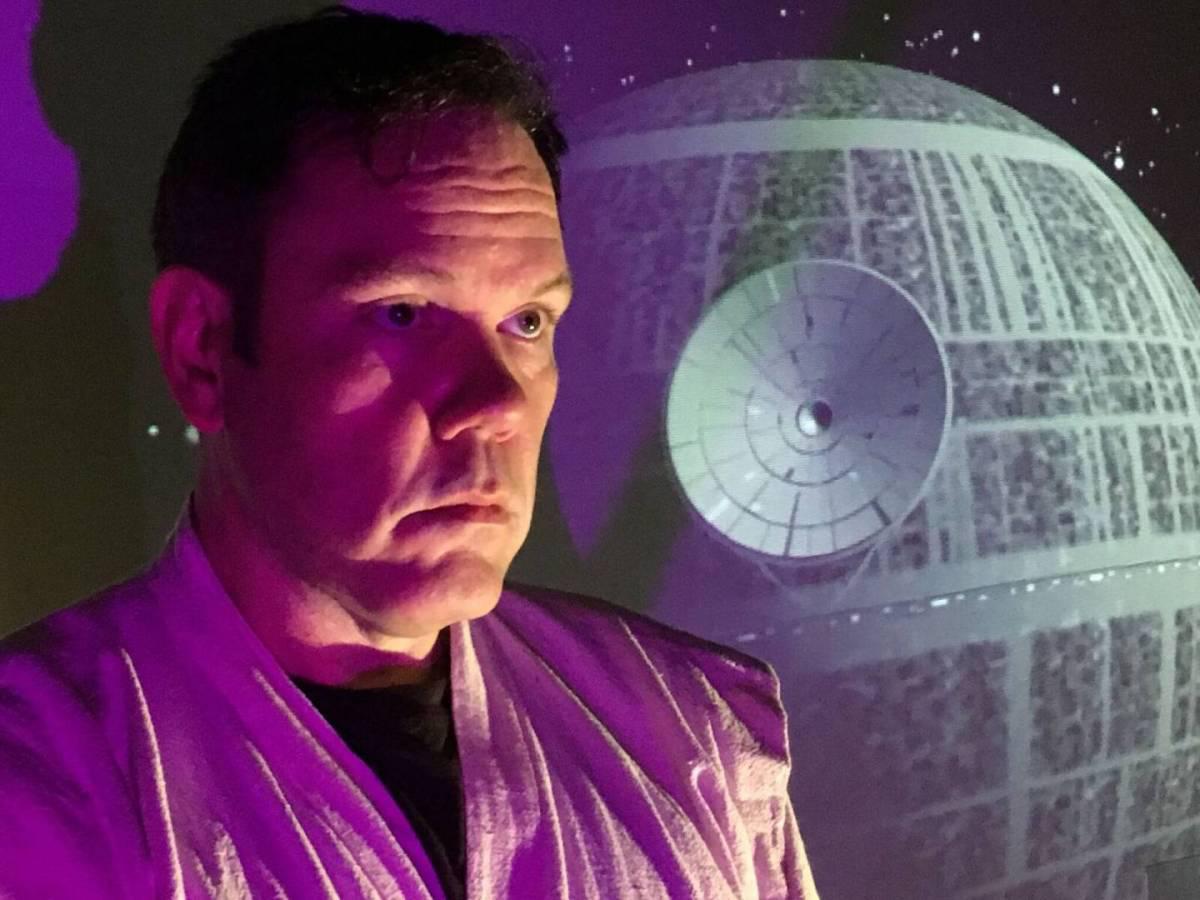|
Star Wars helped fight director Nicholas Harrison survive the Dark Side of child abuse
By Janet Smith
[with video] When Nicholas Harrison was nine years old, he saw Star Wars—a movie that didn’t just change his life but, as he puts it, saved it. He’d been invited to his first birthday party, to watch Smokey and the Bandit with some other boys, and started wandering between the theatres of the multiplex. Something caught his attention on one of the big screens: two robots were walking across a sand dune, and one said, “We were made to suffer. It seems to be our lot in life.” The words struck a nerve in the boy, who had endured more suffering than any child should ever have to face—almost five straight years of unspeakable physical and sexual abuse by the teachers, nuns, and priests at his Catholic elementary school. Later, another line hit him just as hard: the elderly Obi Wan Kenobi telling the evil Darth Vader “If you strike me down, I shall become more powerful than you can possibly imagine.” “Seeing this old man go up against Darth Vader: it was amazing to me, having this courage,” Harrison recalls, sitting with the Straight in a West Broadway coffee shop. “So I had to go back and watch it all the way through with my dad. It gave me hope that this small group of misfits could win against an organization like the Empire. The Empire has order and discipline—it even has black robes…” The preteen Harrison figured that if he could just use the Force, he would be able to protect himself. “I wanted to know more about what that Jedi was; I kept going back to ‘What was this Jedi?’” Harrison would follow that dream into adulthood, becoming as close to a modern-day Jedi as might be possible on 21st-century Earth. In his youth, he began studying martial arts. He would go on to pursue kendo, the Japanese martial art that inspired Star Wars’ light-sabre battles, even fighting professionally on the British kendo team. He would become a fight director, working for companies like Vancouver Opera and Bard on the Beach, as well as an actor and a stuntman. “A lot of people say ‘How did you become a fight director?’ ” he says. “And I’m always like, ‘Do you want the short or the long version?’ ” It’s a story of survival and hope that he turned into his doctoral thesis at UBC. And now, at the encouragement of some of his theatre colleagues, finally into a one-man show—How Star Wars Saved My Life. A father of two, and a teacher with his PhD, Harrison has put his world strongly back together, but when he talks about the secrets he carried with him in childhood, the raw emotion is, understandably, still near the surface. “Because of the way pedophiles operate, they used shame, guilt, humiliation, and, in my case as a child, they used God on me,” says Harrison, who points out he sees the scar one of them left on his chin, after throwing him down the stairs, every time he looks in the mirror in the morning. “Apparently God would kill me and my family. I was dirty and needed to be purified.” The abuse started in kindergarten and continued, brutally and from several perpetrators, into Grade 4. That’s when his mother saw him resisting putting on shorts for a warm spring day and noticed the welts all over his body—wounds from a teacher beating him with her favourite weapon, the heavy Bakelite plug on a kettle. She pulled him out of the school immediately. That was just about half a school year before he saw Star Wars. But it wasn’t till the late ’90s, in adulthood, that Harrison would finally tell his parents about the violent sexual abuse he had endured from the priests—an admission that eventually led to a successful court case. “Remember: this was before Boston and before Spotlight,” Harrison says, referring to the movie about the press exposing massive sexual abuse in the Catholic church there. “It was really hard to go up to this small town and get people to speak out, because the church has so much power in a small community. With one of my abusers, we did a two-day discovery; I was able to sit across from this guy. He was old and frail. In the town they brought him up from the retirement home; they had a dinner for him at the church that night. “I wasn’t six foot four, I wasn’t a fight director back when it all happened, and he wasn’t an 80-year-old back then. But people were not willing or wanting to accept that—especially for a male to talk about it.” Taking this story to the stage, as hard as it is to do, is Harrison’s way of fighting that conspiracy of silence, and of letting other victims know they’re not alone, and that it’s safe to talk about their past traumas. He’s also mounting the play for his childhood self, the kid who was too afraid to speak up. “Why am I doing it? To not let the institution of abusers get away with it,” he says matter-of-factly. “To be a constant voice speaking out. This happened to me, so what can I do to make the world a better place?” In the show, Harrison interweaves his biography with intermittent journeys into the world of Star Wars. He’s been helped over the past few years of putting it together by director and dramaturge Valerie Methot. Throughout, he plays the key characters in his life—his child self, his mother, his therapist, and even a few of his abusers. But it’s not all dark: even in conversation, Harrison often uses humour to break the grip of the story he carries with him—because Harrison wants that story to be one of hope, like Star Wars. You could say that he wants to show us the way out of the Dark Side and into the light. Before he goes, to show how much one film still steadies him on his journey today, he pulls a timeworn figurine out of his pocket. It’s a plastic R2-D2 from decades ago. “I used to carry him with me all the time; I remember as a kid talking to him,” Harrison admits. “When I got married he was in my pocket; defending my MA or my PhD he was in my pocket.” And with that, he puts his loyal droid away, carrying him with him as he leaves.
|
.
Any original material on these pages is copyright © BishopAccountability.org 2004. Reproduce freely with attribution.

